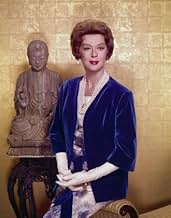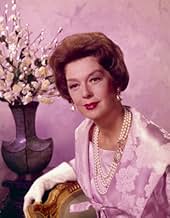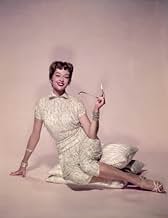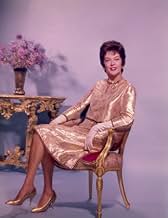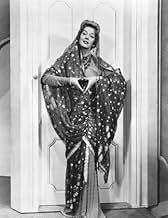CALIFICACIÓN DE IMDb
7.9/10
13 k
TU CALIFICACIÓN
Un huérfano se va a vivir con su tía de espíritu libre. El conflicto surge cuando el albacea de la herencia de su padre se opone al estilo de vida de la tía.Un huérfano se va a vivir con su tía de espíritu libre. El conflicto surge cuando el albacea de la herencia de su padre se opone al estilo de vida de la tía.Un huérfano se va a vivir con su tía de espíritu libre. El conflicto surge cuando el albacea de la herencia de su padre se opone al estilo de vida de la tía.
- Nominado a 6 premios Óscar
- 5 premios ganados y 12 nominaciones en total
- Dirección
- Guionistas
- Todo el elenco y el equipo
- Producción, taquilla y más en IMDbPro
Opinión destacada
When "Auntie Mame" was first published, I read and re-read it (and its sequel, "Around the World with Auntie Mame") for several summers. Believe it or not, the books are even funnier than the film. They were not "memoirs," though that was the PR at the time. Edward Everett Tanner, or "Patrick Dennis," ultimately admitted as much. Auntie Mame was a creation from Tanner's own talented imagination.
No one ever has, or ever will, embody Auntie Mame as well as Rosalind Russell, who, by the time her Broadway performance in the role was filmed, had honed her portrayal to one of the finest in American theatre and film.
Listen to her vocal technique: from high girlish squeals to basso-profundo sarcasm.
Or watch her remarkable body language throughout -- from grande dame theatricality to lowbrow burlesque.
Russell's supporting players are magnificent -- from the 12-year old Jan Handzlik, through Coral Browne, Peggy Cass, Forrest Tucker, Fred Clark, Patrick Knowles, Connie Gilchrist, Yuki Shimoda, Robin Hughes, Roger Smith, Pippa Scott -- and, my own particular favorites who almost, but not quite, steal their scenes from Miss Russell: Willard Waterman, Lee Patrick and Joanna Barnes as the unforgettable Upsons.
George James Hopkins' brilliant sets and set design, and Orry-Kelly's amazing costumes, along with Branislau Kaper's score and Morton Da Costa's direction are like Tiffany settings, showing off this flawless cast at the top of their form.
Lawrence and Lee's original Broadway script was adapted by Betty Comden and Adolph Green, whose main contribution would appear to be the hydraulic furniture at the final dinner party.
The famous line, originally from the Broadway play and not found in the novel, is "Life is a banquet! And most poor sons-of-bitches are starving to death!" "Damn" and "hell" both are heard in the film: but "sons-of-bitches" was apparently too strong for the MPAA in 1958.
Is the film dated? I suppose. In the same way that "Citizen Kane" is dated, or "Some Like It Hot." It's also timeless. And Miss Russell's performance, here at the zenith of her long and distinguished comedic and dramatic career (Eugene O'Neill's "Mourning Becomes Electra," anybody?) is an acting lesson unto itself.
No one ever has, or ever will, embody Auntie Mame as well as Rosalind Russell, who, by the time her Broadway performance in the role was filmed, had honed her portrayal to one of the finest in American theatre and film.
Listen to her vocal technique: from high girlish squeals to basso-profundo sarcasm.
Or watch her remarkable body language throughout -- from grande dame theatricality to lowbrow burlesque.
Russell's supporting players are magnificent -- from the 12-year old Jan Handzlik, through Coral Browne, Peggy Cass, Forrest Tucker, Fred Clark, Patrick Knowles, Connie Gilchrist, Yuki Shimoda, Robin Hughes, Roger Smith, Pippa Scott -- and, my own particular favorites who almost, but not quite, steal their scenes from Miss Russell: Willard Waterman, Lee Patrick and Joanna Barnes as the unforgettable Upsons.
George James Hopkins' brilliant sets and set design, and Orry-Kelly's amazing costumes, along with Branislau Kaper's score and Morton Da Costa's direction are like Tiffany settings, showing off this flawless cast at the top of their form.
Lawrence and Lee's original Broadway script was adapted by Betty Comden and Adolph Green, whose main contribution would appear to be the hydraulic furniture at the final dinner party.
The famous line, originally from the Broadway play and not found in the novel, is "Life is a banquet! And most poor sons-of-bitches are starving to death!" "Damn" and "hell" both are heard in the film: but "sons-of-bitches" was apparently too strong for the MPAA in 1958.
Is the film dated? I suppose. In the same way that "Citizen Kane" is dated, or "Some Like It Hot." It's also timeless. And Miss Russell's performance, here at the zenith of her long and distinguished comedic and dramatic career (Eugene O'Neill's "Mourning Becomes Electra," anybody?) is an acting lesson unto itself.
- Holdjerhorses
- 1 ene 2005
- Enlace permanente
Argumento
¿Sabías que…?
- TriviaRosalind Russell broke her ankle in the first take of the scene where she comes flying down the stairs in the gown with the capri pants and shooting had to be delayed until she recovered.
- ErroresIn 1929 Mame and Lindsey talk about what Dr. Spock has to say on child rearing, a decade before his famous book was published.
- Citas
Mame Dennis: Oh, Agnes, where is your spine? Here you've been taking my dictation for weeks and you don't get the message of my book. Live, that's the message!
Agnes Gooch: Live?
Mame Dennis: Yes! Life is a banquet and most poor suckers are starving to death!
- ConexionesFeatured in AFI's 100 Years... 100 Laughs: America's Funniest Movies (2000)
Selecciones populares
Inicia sesión para calificar y agrega a la lista de videos para obtener recomendaciones personalizadas
- How long is Auntie Mame?Con tecnología de Alexa
Detalles
- Fecha de lanzamiento
- País de origen
- Idiomas
- También se conoce como
- Auntie Mame
- Locaciones de filmación
- Productora
- Ver más créditos de la compañía en IMDbPro
Taquilla
- Presupuesto
- USD 2,240,000 (estimado)
- Tiempo de ejecución2 horas 23 minutos
- Relación de aspecto
- 2.35 : 1
Contribuir a esta página
Sugiere una edición o agrega el contenido que falta

Principales brechas de datos
By what name was Vivir es mi deseo (1958) officially released in India in English?
Responda



















